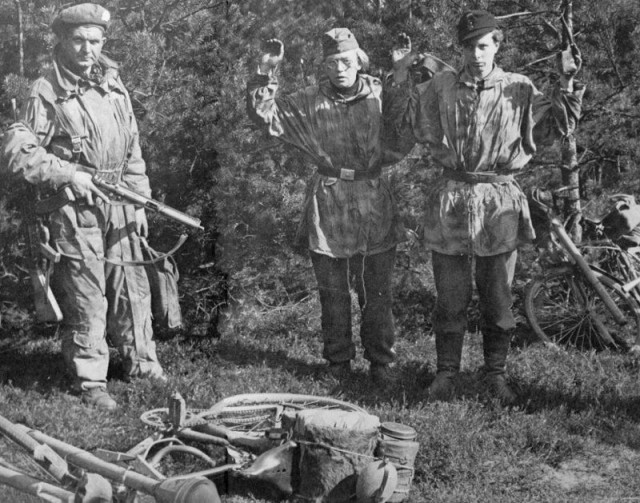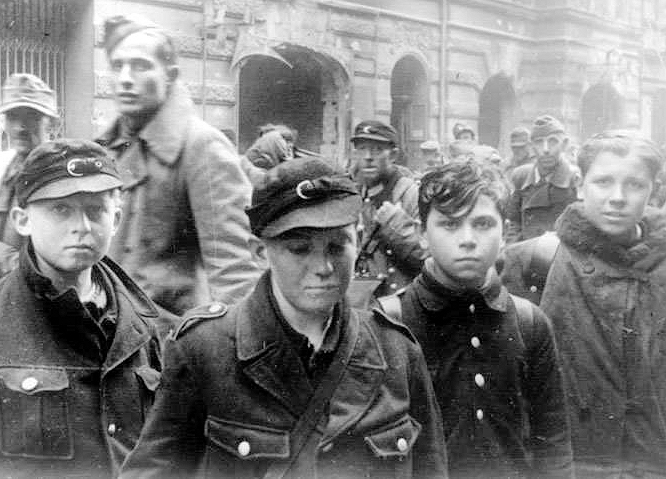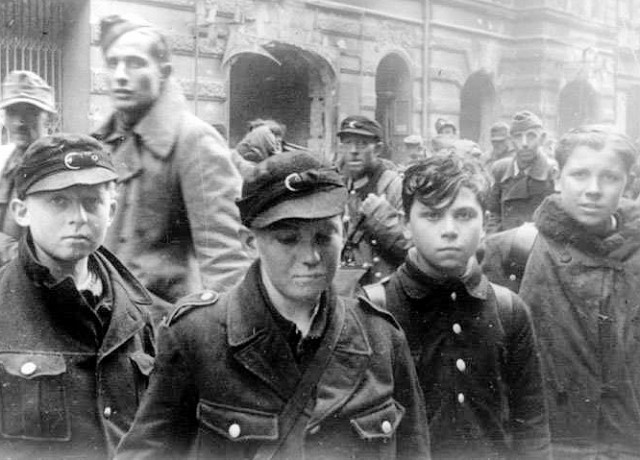From Yank Magazine, 1945
Captured Wehrmacht GIs between the ages of 12 and 17 get special indoctrination in democracy at this PW school sparked by a Yank pfc.
COMPIEGNE, FRANCE- At 14, Julius Meyer was just two inches taller than a standard German rifle. His brown hair was cut short and combed straight down over his forehead and temples from the cowlick at the point of his skull. He had blue eyes with long, curling lashes and the smooth face of innocent boyhood. He wore an odd mixture of GI cast -offs and items of German Army clothing issue,including field shoes that turned up oddly at the toes because they were much too big for him. When he stepped out with his right foot along the dusty camp street, a white letter P painted on his trouser leg flashed in the sun . When he brought his left leg forward , you could see the W.
Julius lived at Kepten, in Bavaria. He was a member of the Hitler Jugend and had learned at school that might is right, the democracy is man’s greatest weakness , that “Aryan” Germans are the finest expression of the human race and that to have Jewish blood in one’s vein is a crime greater than either arson or murder. He learned that the noblest fate open to a German was to die on the field of battle in defense of the Nazi Fatherland.
In December of last year Julius was given his chance to achieve this nobility. He was drafted into the Wehrmacht along with almost every boy of his age in his home village.
Like most youngsters in the German Army, he was assigned to antiaircraft and trained for a place in 20mm. gun crew. Near Wiesbaden, on March 28, he was captured with the rest of the crew before he ever had a chance to fire his weapon in combat.
Today, Julius is at CCPWE 15, near here, one of 7,000 inmate of what is known as the ” Baby Cage” for prisoners of war between the ages of 12 and 17. His life there is as different from that of the prisoners of war elsewhere as it can be.
He is under no military discipline. When an American approaches him in the camp, he tips his hat and says “Good morning,” instead of saluting. When he goes for his morning walk outside the confines of the camp, he strolls along as one of a casual mob that might be any group of civilians out to enjoy the country air. When he comes back from the walk he is likely as not to be carrying a stone,not a very big stone and not too small either, to be used to form a foundation for a camp walk that will be relatively free of mud when the rains come.
He goes to school every other day and learns principally tolerance of other people’s ideas, tolerance of other races and religions. He is taught by German PWs, men who in civilian life were clergymen or teachers and who are relatively free of Nazi taint.
In his leisure time he amuses himself in any way he sees fit : Playing cards which he made himself, or reading one of the 600 books in the “Baby Cage” library, or in some form of sport, or poking his head through the windows of the auditorium to listen to a music lesson or a concert or a talk on American history.
The spark plug of this experiment in re-education is Pfc. Francis Tourtellot of Providence, R.I. Before he was drafted, Tourtellot taught German at Brown University and the Universuty of Wisconsin, where he was preparing to take his Ph.D. Almost since the day he entered the Army two years ago, Tourtellot has been working with German prisoners, first as a member of a prisoner- processing unit back in the States, then over here. When his unit was dissolved and shipped out from CCPWE 15 several months ago, Tourtellot remained behind to help organize the camp for younger PWs.
The officers in charge of the camp listen with respect to this pfc’s opinion and allow him almost complete freedom in carrying out the experiment. He exercises over his 7,000 charges an easy authority which leaves them no room for doubt as to his control, yet seldom gives them the felling of regimentation.
Tourtellot’s office is a building made out of old kitchen tents and walled inside with German army blankets, as are the most of the structures in the camp. Upholstered benches, also covered with German blankets, are built against the walls. There is a big conference table where he meets with the heads of his PW faculty, and desks where his staff of young PWs keeps his files and handles his correspondence.
From this office Pfc. Tourtellot directs the teaching of such subjects as arithmetic, biology, English, American history,geography,German music, religion and sports, and all of which are required. There are also elective subjects such as algebra, geometry, chemistry, drawing, advanced English, French, Russian, Spanish and a stenography and shorthand course.
The most popular language course is Russian.
There are also practical courses in agriculture and farming , commercial subjects and trades, one of which must be taken by each youth for one hour each week.
These courses are for Germans. But there are upwards of 100 Hungarians and 135 Latvians among the 7,000, most of whom do not speak German well enough to attend the German classes. So special schools have been organized for them, more limited in scope but covering the essential subjects.
Textbooks were almost impossible to get, so most of the teaching is done from the memory. Teachers spend two hours preparing the work for each one-hour class. Some English books were available, such as paper bound volumes of “The Republic” by Beard, and “The Republic” by Plato, in addition to American histories and other GI educational publications, but because this is not a GI school, books of all kind were scarce. Most of the volumes in the library were contributed by the YMCA Paris.

Tourtellot holds regular meetings with the principal teachers in each subjects, discussing general policy and impressing them constantly with the need for combatting nationalism, the deep-seated spirit of militarism,racial pride and the ideas instilled by German propaganda.
Most of the boys have never known each other teaching except that given them by Nazi school-masters, and they were unconscious of the basic of the principle of democratic thought as they might expected to be. They got their first practical lesson in democracy when the question came up of making the study of English compulsory. There was some division of opinion and finally it was put to the democratic process of a vote.
The prisoners conducted the balloting themselves. They were thoroughly instructed on the question, then each wrote his desire on a piece of paper. The tellers were young PWs, and the vote was compiled by them. in announcing the results, Tourtellot posted on the camp bulletin board the following notice:
“Through your own free choice you have decided that English be made a compulsory course. Two-thirds of you have voted for it, one-third against it.”
Thus Hitler’s were introduced to the principle of majority rule.
Attempts to twist this principle to their personal advantage are rare among the PWs, but they happen. Among the rations issued occasionally to the boys are the contents of K boxes. These, as every GI knows contain cigarettes. But Tourtellot decided at the start that the boys were not to be given cigarettes. Some he regarded as too young to smoke, and the difficulty of separating those from the older boys was too great. Then, too, the buildings in the camp are highly inflammable and the boys sleep on tinder-dry straw mats which make the danger even greater. So, no cigarettes for the boys.
Then one day it was decided that the cadre at the camp would get the cigarettes that came in the K boxes. The other boys learned this immediately put up a howl. The other boys learned this and immediately put up a howl. That evening some 300 of them stormed Tourtellot’s office. They wanted to know whether this was a decision of the camp commandant or simply a device to permit the cadre to divide up all the cigarettes. They were ordered by the camp’s chief of police, a PW, to disperse. They answered with such cries as “Beat him up!” and “Throw him in the ditch!” They were real mad.
Then Tourtellot came along and sent them packing. Next morning there was a notice on the bulletin board. Because of the disturbance the night before,it declared, there would be no breakfast that day. The failure of the inmates to control the handful of hotheads in their midst was the responsibility of all, and all would be punished.
“Thus,” Tourtellot contended, “they learned that democracy holds the interests of the majority above the demands of an outspoken minority and that a whole people can be made to suffer for the excesses of its leaders.”
The prisoners have their own police and court systems. Inmates who were preparing for careers as lawyers comprise the court’s judges and jury, and all crimes are tried by them. The prisoners have their own defense attorneys and prosecutors. American personnel at the camp attend trials only as observers.
One case tried before the PW court involved the theft of a sweater from one youth and its sale to another. Three witnesses, in the course of their testimony, involved themselves in the crime by stating that the accused had given them the loot to hide overnight or by indicating in other ways knowledge on the offense. The court sentenced all of them-witnesses as well as accused – to heavy labor for several days.
The prisoners take a deep interest in these trials. They crowd into the auditorium until there is hardly room to breathe, and those who can’t get in stand at the windows and lean with an ear against the canvass sides of the structure to hear what goes on inside.
Much of the instruction of the youth is devoted to the works of men whose writings and compositions were banned in Germany because they were Jews. Many of these Germans are hearing for the first time some of the music of Mendelssohn and the poems of Heinrich Heine.
The reaction of the prisoners to this kind of treatment is hard to weigh. They are docile, obedient, eager to help whenever they can, and display all the more charming side of the German character which have made so many GIs like them better than the French, the Belgians or even the Dutch. They take their schooling seriously, and frequently in writing compositions they express appreciation of the opportunity of learning something during their months behind barbed wire.
Probably the best gauge of the effect the teaching is having on the students is the results of the examinations they have taken. In August, teachers and students alike were asked to answer “true” or “false” to some 200 statements.
One of these was:”Hitler was a great idealist.” Only 2,254 thought this was right by and 4,009 labeled it wrong. The remaining 637 were undecided.
Another statement declared: Adolf Hitler was an insane criminal.” This was labeled right by 2,960 prisoners, whi;e 2,981 called it wrong and 959 prisoners were undecided.
Eight hundred and eighteen out of 7,000 professed to think war an evil only when it is not won and 4,347 said they think that “as a race, the Chinese are of equal value to the Germans .”
True-or- false statements that hit at basic principles of Nazi thought brought a surprising reaction. One of them was: “Such a thing as a master race is non-existent .” Of the students, 4,394 said they thought this right and 1,393 marked it wrong. The other 1, 113 were undecided . Ninety one of the teachers called it right, and 41 called it wrong.
Another statement was: “The small, unimportant Nazis are also to blame for Germany’s crimes.” One hundred teachers called this right and 30 wrong, while only 2, 575 students agreed with it and 3,380 called it wrong.
Faced with the assertion that “the Nazi leaders who are now in Allied captivity should all be hung by the neck without delay, ” 3,170 of the students said they agreed with this and 2, 295 thought it was wrong. Of the teachers, only 26 agreed and 95 called it wrong.
The most interesting set of statements concerned anti-Semitism. Here are some of them, and the student’s answers:
“I must not marry a Jewish girl because my children will be inferior.” Only 514 said they thought this right, and 6,058 labeled it wrong.
“It makes no difference at all if I marry a Jewess.” Only 924 called this false, and 5,376 labeled it true. A third of the teachers called it false.
“It makes no difference at all if I have Jewish ancestors.” Only 668 labeled this false, 5,814 calling it true.
There were two additional true-false statements of the “Have you stopped beating your wife yet?” variety. One ran this way: “If I have a pure Aryan father and a Jewish mother, then I am only half inferior.” This was rejected as spurious reasoning by 6, 333 youths . The second went as follows: “Converted Jews are not so bad as Orthodox Jews .” The results indicated a certain lack of logical follow-through in the boy’s thinking, 319 calling it correct , 2,647 calling it false, and the largest proportion, 2, 734, being undecided.
TOURTELLOT believes that this group of questions poses some interesting possibilities for analysis. It would seem, at first glance, that although anti-Semitism was one of the primary principles of Nazism, the youth of Nazi Germany was not greatly impressed by it despite years of effort by the greatest propaganda machine in the world. However, there is also likelihood that in this instance the prisoners were answering the questions the way they suspected the American Army would like to see them answered.
Tourtellot himself won’t give a flat opinion as to the effectiveness of his work. “All I do is carry out the program and get the results on paper,” he said. “You can draw your own conclusions.”
By Cpl. HOWARD KATZANDER
YANK Staff Correspondent
This article was provided by OldMagazineArticles.com

